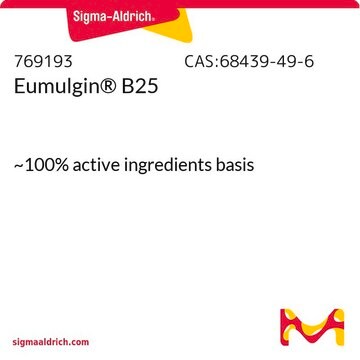466387
Brij® S 100
average Mn ~4,670
Synonym(s):
Polyoxyethylene (100) stearyl ether
Sign Into View Organizational & Contract Pricing
All Photos(3)
About This Item
Linear Formula:
C18H37(OCH2CH2)nOH, n~100
CAS Number:
MDL number:
UNSPSC Code:
12162002
PubChem Substance ID:
NACRES:
NA.23
Recommended Products
mol wt
average Mn ~4,670
Quality Level
mp
51-54 °C (lit.)
hydroxyl value
13‑25 mg KOH/g
solubility
propylene glycol and xylene: insoluble
density
1.1 g/mL at 25 °C (lit.)
HLB
18
InChI
1S/C20H41O2/c1-2-3-4-5-6-7-8-9-10-11-12-13-14-15-16-17-19-22-20-18-21/h2-20H2,1H3
InChI key
PSEGVHKUPXNGGJ-UHFFFAOYSA-N
Looking for similar products? Visit Product Comparison Guide
Related Categories
Application
Brij® S 100 may be used:
- as a non-ionic surfactant to study its interactions with luminol electrochemiluminescence for bioanalysis
- as a carrier material to study the formulation of nimodipine, fenofibrate, and o-vanillin using the particles from gas-saturated solution (PGSS) process
- as a hydrophilic surfactant in the casting solution to prepare an asymmetric flat sheet nanofiltration membranes and to study its effects on the hydrophilic property of the poly(ethersulfone) (PES) nanofiltration membranes
Legal Information
Brij is a registered trademark of Croda International PLC
Signal Word
Warning
Hazard Statements
Precautionary Statements
Hazard Classifications
Acute Tox. 4 Oral
Storage Class Code
11 - Combustible Solids
WGK
WGK 2
Flash Point(F)
Not applicable
Flash Point(C)
Not applicable
Personal Protective Equipment
dust mask type N95 (US), Eyeshields, Gloves
Choose from one of the most recent versions:
Already Own This Product?
Find documentation for the products that you have recently purchased in the Document Library.
Customers Also Viewed
Formulation of nimodipine, fenofibrate, and o-vanillin with Brij S100 and PEG 4000 using the PGSS process
Kravanja G, et al.
Journal of Supercritical Fluids, 135, 245-253 (2018)
Anne Huhtala et al.
Journal of ocular pharmacology and therapeutics : the official journal of the Association for Ocular Pharmacology and Therapeutics, 19(1), 11-21 (2003-03-22)
This study was undertaken to investigate the use of the in vitro test WST-1, an assay of cell proliferation and viability, for a preliminary safety evaluation of topical ophthalmic preparations. The cytotoxicity of two surfactants, benzalkonium chloride (BAC) and polyoxyethylene-20-stearyl
Jae-Haeng Song et al.
Drug development and industrial pharmacy, 35(8), 897-903 (2009-02-26)
The oral administration of loratadine, an antihistamine, can have a variety of adverse side effects, such as headache, fatigue, and nausea, because of the transient high blood concentration. To avoid these effects, loratadine can be administered using a transdermal drug
S O Williams et al.
Drug development and industrial pharmacy, 26(1), 71-77 (2000-04-01)
The purpose of this study was to scale up an oil/water (o/w) cream formulation containing 40% diethylene glycol monoethyl ether (DGME), developed via 300-g laboratory batches in a 2(5-2) fractional factorial design, to 7-kg batch sizes in a Brogli-10 homogenizer.
J Q Zhang et al.
Drug delivery, 14(6), 381-387 (2007-08-19)
The study describes the development of stealth solid lipid nanoparticles (SLNs) as colloidal carriers for silibinin, a drug with very low solubility. Stealth SLNs were constituted mainly of bioacceptable and biodegradable lipids, such as stearic acid and surfactant Brij 78
Our team of scientists has experience in all areas of research including Life Science, Material Science, Chemical Synthesis, Chromatography, Analytical and many others.
Contact Technical Service









